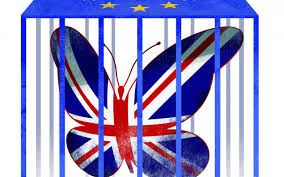
The Bank of England governor, Mark Carney, has warned that a bad deal for Brexit could result in an increase of between 5 to 10 per cent in food prices in the United Kingdom.
If the Brexit is extremely disorderly, food prices can rise by 10 per cent and they can rise by about 6 per cent in the eventuality of a less severe scenario, Carney has told British MPs.
The possible impact of Brexit under various scenarios have been attempted to be assessed on several occasions by the Bank of England and its governor.
In all the assessments that the central bank has made, a potential negative for the economy has been portrayed.
Imports accounted for more than half of the food consumed in the UK, said Carney's colleague, Sir Jon Cunliffe. The Sainsbury boss says that the retailers and wholesalers cannot stockpile many of the food items.
According to bank, the constituents of the price hike in food would partly include a fall in the value of the pound, additional expenses at the border for checking and examination of imports and partly because of any new tariffs that would be imposed after Brexit.
"In the most extreme scenario, your shopping bill goes up 10%," Carney told MPs on the Treasury Committee.
The ports of the country are currently not in a position to handle a no-deal Brexit since that would mean that the imports and trade would have to be done according to regulations and norms of the World Trade Organization (WTO), Carney also said.
"At this point in time, the ports are not ready for a move to an administered WTO relationship. To be absolutely clear, our agents, my colleagues, we have gone to these ports and had conversations directly with the ports in question. We have talked to the private logistics companies, so we have gathered direct information on this," he said.
There would be imposition of tariffs on goods traded by the UK under WTO rules. The tariffs according to the norms of the WTO have a wide range – from the 0 per cent for mineral fuels and pharmaceuticals, to about 20 to 35 per cent for import of processed food and to about 45 and 50 per cent on meat.
He had spent the weekend with the head of the WTO, Roberto Azevedo, Carney said.
If the UK chose not to levy any new tariffs on goods imported to and from the EU countries and chose to avail the tariff-free benefits of membership of the European Union, then the same has to be applied by the country for every one else that it trades with.
The bank has taken a lot of trouble to prepare the Brexit assessment reports, Carney told the MPs. "There's no exam crisis. We didn't stay up all night."
(Source:www.bbc.com)
If the Brexit is extremely disorderly, food prices can rise by 10 per cent and they can rise by about 6 per cent in the eventuality of a less severe scenario, Carney has told British MPs.
The possible impact of Brexit under various scenarios have been attempted to be assessed on several occasions by the Bank of England and its governor.
In all the assessments that the central bank has made, a potential negative for the economy has been portrayed.
Imports accounted for more than half of the food consumed in the UK, said Carney's colleague, Sir Jon Cunliffe. The Sainsbury boss says that the retailers and wholesalers cannot stockpile many of the food items.
According to bank, the constituents of the price hike in food would partly include a fall in the value of the pound, additional expenses at the border for checking and examination of imports and partly because of any new tariffs that would be imposed after Brexit.
"In the most extreme scenario, your shopping bill goes up 10%," Carney told MPs on the Treasury Committee.
The ports of the country are currently not in a position to handle a no-deal Brexit since that would mean that the imports and trade would have to be done according to regulations and norms of the World Trade Organization (WTO), Carney also said.
"At this point in time, the ports are not ready for a move to an administered WTO relationship. To be absolutely clear, our agents, my colleagues, we have gone to these ports and had conversations directly with the ports in question. We have talked to the private logistics companies, so we have gathered direct information on this," he said.
There would be imposition of tariffs on goods traded by the UK under WTO rules. The tariffs according to the norms of the WTO have a wide range – from the 0 per cent for mineral fuels and pharmaceuticals, to about 20 to 35 per cent for import of processed food and to about 45 and 50 per cent on meat.
He had spent the weekend with the head of the WTO, Roberto Azevedo, Carney said.
If the UK chose not to levy any new tariffs on goods imported to and from the EU countries and chose to avail the tariff-free benefits of membership of the European Union, then the same has to be applied by the country for every one else that it trades with.
The bank has taken a lot of trouble to prepare the Brexit assessment reports, Carney told the MPs. "There's no exam crisis. We didn't stay up all night."
(Source:www.bbc.com)





